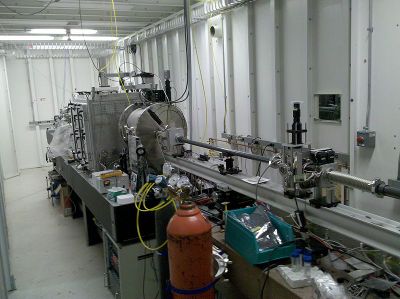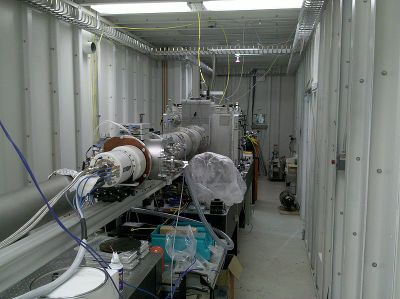Difference between revisions of "X9"
KevinYager (talk | contribs) (→Performance) |
KevinYager (talk | contribs) |
||
| Line 4: | Line 4: | ||
==Capabilities== | ==Capabilities== | ||
| − | + | [[Image:X9-scale.png|center|thumb|600px|X9 hutch layout]] | |
| + | X9 can perform a variety of x-ray scattering experiments: | ||
| + | * [[SAXS]] and [[WAXS]] on powders or solutions in capillaries. | ||
| + | * [[SAXS/WAXS]] (simultaneous) on proteins or other macromolecules in solution, using a full-vacuum path and a flow-through cell (for robust background subtraction). | ||
| + | * [[GISAXS]] and [[GIWAXS]] on thin films. | ||
==Performance== | ==Performance== | ||
| Line 22: | Line 26: | ||
* '''~0.4 m''' (sample upstream of chamber): 0.15 Å<sup>−1</sup> to 2.1 Å<sup>−1</sup> (4.2 nm to 0.3 nm) | * '''~0.4 m''' (sample upstream of chamber): 0.15 Å<sup>−1</sup> to 2.1 Å<sup>−1</sup> (4.2 nm to 0.3 nm) | ||
| + | ===Resolution=== | ||
| + | * SAXS: Pixel-limited resolution at 5 m (sample-detector) is ~0.0017°, or 0.0002 Å<sup>−1</sup> (at ~13.5 keV). | ||
| + | * WAXS: Pixel-limited resolution is ~0.04°, or 0.0046 Å<sup>−1</sup> (at ~13.5 keV). Actual resolution depends on experimental setup and sample size. | ||
===Flux=== | ===Flux=== | ||
| Line 27: | Line 34: | ||
* At 10 keV, flux at sample is ~5×10<sup>11</sup> ph/s/0.01%bw | * At 10 keV, flux at sample is ~5×10<sup>11</sup> ph/s/0.01%bw | ||
* At 10 keV, microfocused (10 um), flux at sample is ~2×10<sup>11</sup> ph/s/0.01%bw | * At 10 keV, microfocused (10 um), flux at sample is ~2×10<sup>11</sup> ph/s/0.01%bw | ||
| + | |||
| + | ===Beam Size=== | ||
| + | * TSAXS: Typical beam size is ~150 µm horizontal and ~100 µm vertical. | ||
| + | * GISAXS: Typical beam size is ~120 µm horizontal and ~50 µm vertical. | ||
| + | * Microbeam: Beam can be focused to ~15 µm (horizontal and vertical). | ||
==Safety== | ==Safety== | ||
Users must complete [http://www.bnl.gov/ps/nsls/users/access/training.asp NSLS safety training], as well as receive beamline-specific training: | Users must complete [http://www.bnl.gov/ps/nsls/users/access/training.asp NSLS safety training], as well as receive beamline-specific training: | ||
* [http://beamlines.ps.bnl.gov/forms/BLOSA/X9.pdf X9 BLOSA form] | * [http://beamlines.ps.bnl.gov/forms/BLOSA/X9.pdf X9 BLOSA form] | ||
| + | |||
| + | ==See Also== | ||
| + | * [http://www.bnl.gov/ps/x9/ X9 NSLS Official Site] | ||
Revision as of 16:04, 3 June 2014
X9 is an x-ray synchrotron beamline at the National Synchrotron Light Source (NSLS), Brookhaven National Lab (BNL). It is a joint beamline between the NSLS and the Center for Functional Nanomaterials. The instrument is optimized for doing Small-Angle X-ray Scattering (SAXS) and Grazing-Incidence Small-Angle X-ray Scattering (GISAXS), as well as wide-angle Grazing-Incidence X-ray Diffraction (GID/GIXD/GIWAXS).
Contents
Capabilities
X9 can perform a variety of x-ray scattering experiments:
- SAXS and WAXS on powders or solutions in capillaries.
- SAXS/WAXS (simultaneous) on proteins or other macromolecules in solution, using a full-vacuum path and a flow-through cell (for robust background subtraction).
- GISAXS and GIWAXS on thin films.
Performance
Energy range
Can perform experiments from 6 keV to 20 keV.
q-range
The instrument can capture data on both a SAXS and WAXS detector (either simultaneously or sequentially). The q-range depends on x-ray energy and the sample-detector distance. For SAXS, one can typically obtain (e.g. for 13.5 keV):
- 5.4 m: 0.002 Å−1 to 0.1 Å−1 (314 nm to 6.3 nm)
- 4.1 m: 0.005 Å−1 to 0.2 Å−1 (125 nm to 3.5 nm)
- 3.0 m: 0.004 Å−1 to 0.2 Å−1 (157 nm to 3.5 nm)
- 2.0 m: 0.010 Å−1 to 0.4 Å−1 (63 nm to 1.6 nm)
- 1.5 m: 0.011 Å−1 to 0.45 Å−1 (63 nm to 1.4 nm)
For WAXS, standard configurations yields approximately (for 13.5 keV):
- 0.235 m (sample inside chamber): 0.13 Å−1 to 4.1 Å−1 (4.8 nm to 0.15 nm)
- ~0.4 m (sample upstream of chamber): 0.15 Å−1 to 2.1 Å−1 (4.2 nm to 0.3 nm)
Resolution
- SAXS: Pixel-limited resolution at 5 m (sample-detector) is ~0.0017°, or 0.0002 Å−1 (at ~13.5 keV).
- WAXS: Pixel-limited resolution is ~0.04°, or 0.0046 Å−1 (at ~13.5 keV). Actual resolution depends on experimental setup and sample size.
Flux
- At 10 keV, flux capture by mirrors is ~2×1012 ph/s/0.01%bw
- At 10 keV, flux at sample is ~5×1011 ph/s/0.01%bw
- At 10 keV, microfocused (10 um), flux at sample is ~2×1011 ph/s/0.01%bw
Beam Size
- TSAXS: Typical beam size is ~150 µm horizontal and ~100 µm vertical.
- GISAXS: Typical beam size is ~120 µm horizontal and ~50 µm vertical.
- Microbeam: Beam can be focused to ~15 µm (horizontal and vertical).
Safety
Users must complete NSLS safety training, as well as receive beamline-specific training:


